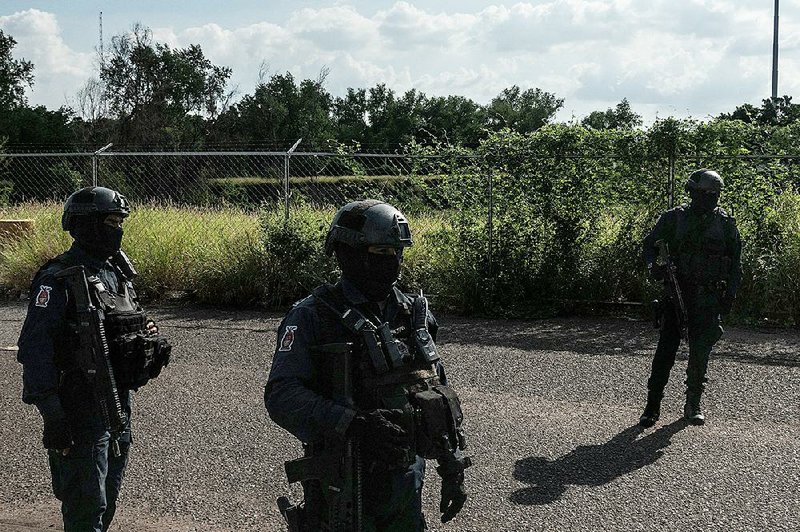MEXICO CITY -- Mexico's government expressed alarm late Tuesday after President Donald Trump said he was planning to designate Mexican drug cartels as terrorist organizations, a move that Mexican officials fear will complicate security cooperation and trade between the neighbors.
"Mexico will never accept any action that violates our national sovereignty," Foreign Minister Marcelo Ebrard tweeted. "We will act firmly. I have sent our position to the U.S. as well as our resolution on combating transnational organized crime."
The Foreign Ministry said Ebrard would contact Secretary of State Mike Pompeo to set up an urgent meeting to discuss "this theme of high relevance for the bilateral agenda."
Ebrard later tweeted that he'd already been in contact with the U.S. government and would use diplomacy to "defend sovereignty."
Trump told former Fox News host Bill O'Reilly in a radio interview broadcast Tuesday night that Mexican cartels "will be designated" as Foreign Terrorist Organizations. The president noted that he had already suggested sending the U.S. military to help Mexico tackle organized crime, but was turned down by President Andres Manuel Lopez Obrador.
"I've actually offered him to let us go in and clean it out and he so far has rejected the offer. But at some point, [something] has to be done," Trump said, citing the damage done by drugs to American addicts and their families.
In rejecting Trump's approach, Lopez Obrador said previous Mexican administrations had declared war "and it didn't work."
The president added that the American government had been working on the terrorist designation for the past 90 days. "You have to go through a process, and we're well into that process," he said.
Lopez Obrador said Wednesday that he did not want to enter a "political confrontation" with the U.S. government on the eve of its Thanksgiving holiday. He said that he would leave it at "cooperation, yes; interventionism, no," and that he had instructed Ebrard to explain Mexico's position to Washington.
Mexico's Senate president, Ricardo Monreal, a member of the president's party, said in a Twitter post Tuesday night that the designation would allow the U.S. government "to use legal and institutional means that would permit it to act unilaterally in our territory with the justification of pursuing those groups."
Deadly violence by drug cartels in Mexico gained new attention in the United States in recent weeks after the killings of six children and three mothers, all dual Mexican and U.S. citizens, who were part of a fundamentalist Mormon community in the north of the country.
After that ambush, Trump said on Twitter that the time had come "for Mexico, with the help of the United States, to wage WAR on the drug cartels and wipe them off the face of the earth."
In the interview posted online Tuesday, Trump declined to say what measures he would consider taking once the cartels had been designated as terrorist organizations. When O'Reilly asked if drone strikes in Mexico were a possibility, the president replied, "I don't want to say what I am going to do, but they will be designated."
"Look, we are losing 100,000 people a year to what is happening and what is coming through from on Mexico," the president said, without elaborating. "They have unlimited money, the people, the cartels, because they have a lot of money, because it is drug money and human trafficking money."
Under U.S. law, a violent foreign group or individual who threatens American security can be designated as terrorist in nature and be subject to special sanctions. Any institution dealing with a designated terrorist -- such as a bank or government official -- comes under heavy scrutiny and potential punishment.
Arturo Sarukhan, a former Mexican ambassador to Washington, said that the U.S. government could go so far as limiting cooperation with a country that is home to designated terrorist groups, reducing imports or refusing to vote for loans for that nation from multilateral organizations.
Presidents George W. Bush and Barack Obama had considered designating Mexican drug lords or cartels as terrorists, he said in a telephone interview. "When they realized the economic and trade implications it would have on U.S.-Mexican ties, they backed down."
A terrorist designation also could disrupt the bilateral cooperation in fighting organized crime built up over years, Sarukhan said.
The news is sure to revive Mexicans' concerns about possible U.S. military involvement in combating drug trafficking on their soil.
Mexico appeared to be caught off guard by Trump's announcement. On Monday, Ebrard said Mexico "would never accept" that its criminal groups be designated as terrorists by the U.S. government, because "this invokes a disposition to act in a direct manner."
"But I think the United States isn't going to go this route," he said.
Mexico's homicide rate is on track to hit record levels this year, with organized-crime groups fighting over trafficking routes, extortion rackets, gasoline theft and other activities in many parts of the country.
Lopez Obrador, who took office a year ago, has maintained a generally cordial relationship with Trump, despite the U.S. leader's frequent criticism of Mexico. In June, the Mexican leader agreed to crack down on U.S.-bound migrants from Central America after Trump threatened stiff tariffs.
Information for this article was contributed by Mary Beth Sheridan of The Washington Post; by Liam Stack and Kirk Semple of The New York Times; and by Darlene Superville and Christopher Sherman of The Associated Press.
A Section on 11/28/2019
